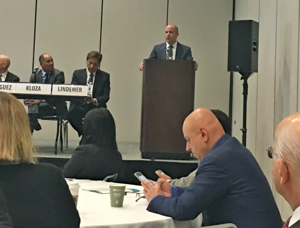CERAWeek '17: Motiva CEO discusses impact of border tax, US regulations
Implications of a proposed border tax could create higher crude and product prices, inflated margins and increased operating costs for the US refining industry, Dan Romasko, president and CEO of Motiva Enterprises said during a panel discussion at CERAWeek Tuesday, March 7.
“If you put it all together though, it’s hard to imagine that the consumer in the US is going to accept this, because they’re the end payer for this border tax,” Romasko said.
Looking at the long-term, the implications to the downstream would include increased US production, Romasko said. But there also would cause an erosion of domestic demand, and a decrease of crude imports, which would in turn lead to the US becoming less competitive globally.
“The loss of global competitiveness, at least in the manufacturing industry, is due to the increase in costs associated with the goods and services we purchase," Romasko said. "Second is the atrophy of our cost-control muscle."
Aside from tax reform, US regulations, specifically Renewable Fuel Standard and the RIN price, seem to cause debate within the downstream about whether there truly is a material impact on the industry, Romasko said.
“We don’t believe that the RIN price or the Point of Obligation have any impact on the segment or integrated margin,” Romasko said. “We also don’t believe that anybody actually pockets any value to these RIN prices.”
Romasko believes that free markets tend to move in the direction of the goals of the RFS without the need for the regulation. He used the blending of ethanol as an example of how free markets adjust naturally.
“The market did what all free markets do when you have a variable that’s common to all, and unique to none – it competes it away,” Romasko said. “If there is no correlation between the RIN and the profitability of any segment, who’s pocketing this RIN? And the answer is no one is.”








Comments